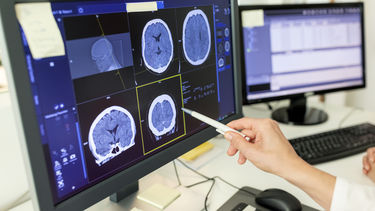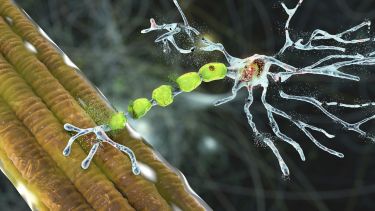- AI software for stroke assessments
- Sheffield team awarded share of $5 million global funding
- New company launched to develop therapeutics for stroke and spinal cord injury
- An institutional approach to tackling a condition that causes loneliness
- Research study identifies a new therapeutic target for Alzheimer’s disease
From AI-derived software to enzymes, discover some of the news stories that defined our year.
New guidance approves AI-derived software for stroke assessments
Two cutting-edge artificial intelligence tools used to assist the diagnosis of strokes have been approved by the National Institute for Health and Care Excellence (NICE).
The team of national experts, which includes Sheffield researchers Professors Li Su and Nigel Hoggard, have given the green light to AI-derived software solutions e-Stroke and RapidAI. These technologies are poised to transform the landscape of stroke diagnosis and treatment in the National Health Service (NHS).
Reimagining stroke care with AI
Sheffield team is sole UK recipient to be awarded share of $5 million global funding to fight motor neuron disease
A team of researchers from the University of Sheffield have been awarded a share of a prestigious grant to fight MND.
Tambourine Philanthropies, a United States charity, in partnership with the Milken Institute is committing over $5 million to eight research teams around the world, with the University of Sheffield being the only one in the UK.
New company Midland Pharmaceuticals launched to develop therapeutics for stroke and spinal cord injury
Our researchers have joined forces with NLC Health Ventures to co-found a company to develop therapeutics for stroke and spinal cord injury.
Midlands Pharmaceuticals will develop MLP-1236, an inhibitor of two enzymes associated with inflammation caused by injury to the central nervous system.
Innovative therapies for neurological conditions
An institutional approach to tackling a condition that causes loneliness
Loneliness Awareness Week addresses the issues around loneliness and highlights how it can affect mental health.
Our researchers are developing interventions to prevent and cure health conditions that can lead to loneliness.
Addressing loneliness-related health
Research study identifies a new therapeutic target for Alzheimer’s disease
Research undertaken by Dr Simon Bell and led by Professor Heather Mortiboys from the Neuroscience Institute has identified a specific enzyme that impacts glucose metabolism and cell function in Alzheimer’s disease
The findings of this study in show a reduction of astrocytes in hexokinase 1 (HK1) in the early stages of Alzheimer’s disease and identify this enzyme as a new therapeutic target for potential treatments.





